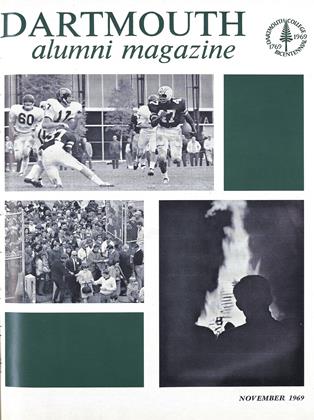ByCarl McGowan '32. Evanston: Northwestern University Press, 1969. 100 pp. $3.50.
This book has been fashioned from three lectures delivered at Northwestern University School of Law under the auspices of the Jules Rosenthal Foundation. The lecturer and author is Judge Carl McGowan of the United States Court of Appeals for the District of Columbia Circuit.
He has managed the difficult task of saying something important, comprehensible to the layman, about a subject usually considered penetrable only by a professional. Not only will the lawyer find in this work new windows on his professional heritage but also the non-professional reader, with a minimum concern for his country's history, will encounter frequent flashes of illumination on the coexistence of federal and state judicial systems generally accepted without enquiry. The fruit of the reading, as will quickly appear, stems from the writer's skill in communication. Judge McGowan, literate and thoughtful, is a turner of the neat phrase, a practitioner of wry understatement, and a wit who cannot become pedantic, despite the necessarily serious subject matter.
The author helpfully identifies the historical sources of our bilateral complex of federal and state courts, each simultaneously exercising wide and often parallel jurisdiction within the same nation. Although we as a people have learned to view this duality as a norm, it is basically an anomaly, as the author makes clear by demonstrating that parallel court systems are less than essential to a federal form of government.
Judge McGowan then deals with what he calls "the stresses of coexistence" between the two components. Strains of necessity flourish, arising often from sensitivity by state judges to a common tendency to regard federal judges as a superior breed, and from a companion irritation at the limiting of the creative latitude of state judges by a constant enlargement of federal law. The "loudest sounds of discord," notes Judge McGowan, have emerged in the field of criminal law and procedure. The author takes the long view in regarding clashes as inevitable "from the day the Fourteenth Amendment became part of the Constitution."
In his final lecture Judge McGowan deals with the quest for an accommodation of these conflicts. Despite their dimensions, he regards them as soluble through the joint effort of men of good will in the legal profession (on and off the bench), and in legislative chambers.
One solution which he does not seriously consider is a turning back of the clock to a single system. For on balance, as many have concluded before him, Judge McGowan strongly believes that the advantages of the dual system, if intelligently exploited, far offset reliance, even if it were possible, on a single system attempting to meet adequately the problems of so large and so disparate a people as make up our nation. Rather Judge McGowan sees hope in a "renascence of localized government," urged by both President Nixon and President Johnson, as favorable to a stronger system of state courts.
Judge McGowan sees hope too in current moves to improve judicial administration in both systems, including expediting litigation. Those presently beguiled by the tocsin code phrase, "law and order," should note Judge McGowan's belief that trial-delay resulting from understaffed or overburdened courts, but not excess concern for the safeguarding of defendants' constitutional rights, "is currently the greatest weakness in the administration of criminal justice." "Crime rises," says Judge McGowan, "as the time increases from initial arrest to final disposition."
The author likewise finds hope for accommodation between the two systems in the movement in some states to improve standards of selection, tenure, and retirement benefits for judges. Both judges and legislatures must recognize the need for "continuing judicial education," in an expanding electronic attack on the smothering problems of record keeping for courts and in creating a professionally skilled group of "judicial administrators" to relieve judges from all labors other than those for which they by definition have special competence, namely the hearing and deciding of law suits.
Judge McGowan, himself a personification of the best in our judicial profession (whether under federal or state commission), brings to his work not only great professional competence but also a sensitivity to human needs in every form and a thoughtful concern,for their resolution.
Mr. Morin is Librarian of the College,Emeritus.
 View Full Issue
View Full Issue
More From This Issue
-
 Feature
FeatureBlack Studies: A Beginning
November 1969 By SUSAN LIDDICOAT -
 Feature
FeatureThe Most Dangerous Gap of All
November 1969 By THOMAS J. McINTYRE '37 -
 Feature
FeatureThe Dean Charts a Course
November 1969 -
 Feature
FeatureA Conclave of Noted Scientists
November 1969 -
 Feature
FeatureCOED EXCHANGE
November 1969 -
 Article
ArticleWith the Big Green Teams
November 1969
RICHARD MORIN '24
Books
-
 Books
BooksTHE PLOT AGAINST THE PEACE
August 1945 By Charles B. Arthur '34 -
 Books
BooksFrom the Tower Room Looking East
OCTOBER 1966 By E.C. BEER -
 Books
BooksTHE CLAMBAKE MUTINY.
JUNE 1965 By R.J.B. -
 Books
BooksCOUNCIL FIRES ON THE UPPER OHIO
January 1941 By Robert E. Riegel -
 Books
BooksTHE ENGLISH BIBLE AS LITERATURE
April 1931 By Roy Bullard Chamberlin -
 Books
BooksBRAWNY WYCHERLEY
JUNE 1930 By W. B. Pressey


